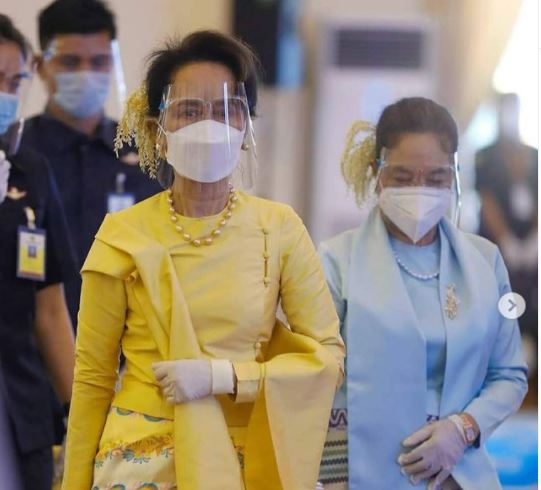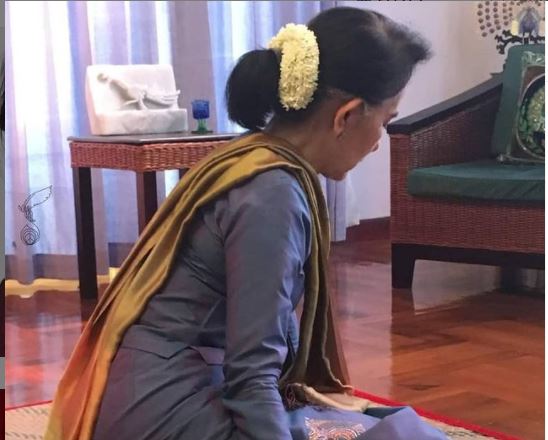Table of Contents
Myanmar’s de facto head of government, Aung San Suu Kyi, has been arrested by the army, according to her party. Suu Kyi and President Win Myint have been taken into custody by the military in the capital, Naypyidaw.
In Myanmar, the military has arrested former freedom icon and de facto head of government Aung San Suu Kyi as well as President Win Myint and other high-ranking politicians. That said Myo Nyunt, a spokesman for the ruling party National League for Democracy (NLD), the German press agency. It was initially unclear whether the politicians were arrested or placed under house arrest on Monday night (local time). There had been rumors of an impending military coup in the Southeast Asian country for days.
Tensions had risen between the civilian government and the powerful military over allegations of fraud in the November general election. The NLD clearly won the vote, but the military refuses to recognize the result. The new parliament should have met for the first time on Monday, but because of increasing tensions in the country, the session was postponed to Tuesday, as the newspaper “Myanmar Times” reported on Friday.
The military had announced consequences
A senior military spokesman had indicated to media representatives last week that there could be a coup if the government does not address the allegations of election fraud. UN Secretary General Antonio Guterres then called for all forms of “incitement or provocation” to be avoided and for the election result to be recognized.
The British broadcaster BBC reported on soldiers in the streets of the capital Naypyitaw and the largest city of Yangon. Telephone lines and the Internet in Naypyitaw have been cut. NLD party spokesman Myo Nyun also said she expected her arrest by security officials soon. “I expect your arrival at any moment,” he told the dpa.
The Nobel Peace Prize laureate Suu Kyi had secured a second term in office in the country with just under 54 million inhabitants in the parliamentary elections. According to official figures, your NLD party won an absolute majority, and the turnout was over 70 percent.
But even after the election, Suu Kyi remained dependent on cooperation with the military. A quarter of the seats in the parliamentary chambers were reserved for the armed forces. This is what it says in the constitution of 2008, which the junta drafted in order not to be disempowered even after the introduction of democratic reforms.
Due to another clause, Suu Kyi cannot become president, but rules the former Burma as a state councilor and thus de facto head of government. Without the military, constitutional changes are not possible, and it controls the most important ministries.
After a coup in 1962, the country was under military rule for almost half a century. Suu Kyi campaigned for a non-violent democratization process in the 1980s and was therefore placed under house arrest for 15 years. In 1991 she received the Nobel Peace Prize for her work against oppression and social injustice.
International criticism of the Nobel Prize winner
The politician is very popular in her own country. Internationally, however, the former freedom icon is now controversial. The promised democratic reforms in the Buddhist country have so far largely failed to materialize, and Suu Kyi is now showing an increasingly authoritarian style of government himself.
 Suu Kyi has come under international criticism primarily because of the state discrimination against the Rohingya and their silence on violence against the Muslim minority. More than a million Rohingya have fled the military attacks in Bangladesh. In a genocide case in The Hague, Suu Kyi had rejected the allegations in 2019. There could be no question of genocide, the army was only defending the country against attacks by armed rebels, she said at the time.
Suu Kyi has come under international criticism primarily because of the state discrimination against the Rohingya and their silence on violence against the Muslim minority. More than a million Rohingya have fled the military attacks in Bangladesh. In a genocide case in The Hague, Suu Kyi had rejected the allegations in 2019. There could be no question of genocide, the army was only defending the country against attacks by armed rebels, she said at the time.
Election observers had already expressed doubts about the legitimacy of the parliamentary election in the run-up to the vote.
Reason: The election commission had decided that in several conflict regions dominated by ethnic minorities, due to security concerns, voting was not allowed at all. This meant that 1.5 million people were excluded from the vote, criticized human rights activists in November. In addition, hundreds of thousands of Rohingya remaining in Myanmar were unable to attend after their citizenship was revoked in 1982. “Human Rights Watch” spoke of an election with “fundamental flaws”.

